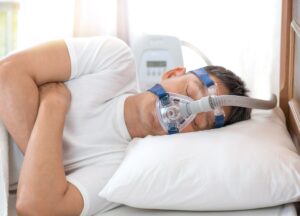
Most people do not realize how serious sleep apnea can be and its impact on one’s health and sense of wellness. Coleman Advanced Dentistry is pleased to offer trusted sleep apnea solutions to restore your restful sleep and enhance your quality of life. You can count on our dentists and team for exceptional care and service.
What Is Sleep Apnea?
Sleep apnea is a common sleep disorder that affects more than 18 million Americans. The potentially serious condition is characterized by a person’s breathing starting and stopping repeatedly through the night, as many as 20-30 times an hour, and hundreds of times through the night. There are different types of sleep apnea, the most common of which is known as obstructive sleep apnea, or OSA.
Obstructive sleep apnea typically results from the soft tissues and muscles in the back of the throat relaxing and obstructing the upper airway, leading to breathing pauses that can last 10 seconds or more. The brain senses the resulting lack of oxygen and briefly wakes up the patient to start breathing once again. The low oxygen levels throughout the night can lead to serious health complications.
What Are the Signs and Symptoms of Sleep Apnea?
Sleep apnea often goes undetected because it occurs during sleep. Many people struggle with undesirable symptoms but do not realize they have sleep apnea until altered by a loved one or significant other.
The most common symptoms of sleep apnea include loud snoring and waking up repeatedly through the night snorting, choking, or gasping for air. People with obstructive sleep apnea often grind and clench their teeth during sleep, a condition known as bruxism.
Signs of sleep apnea may include restless sleep and insomnia. Patients often report morning headaches, waking up with a dry mouth, daytime sleepiness, fatigue, irritability, anxiety, stress, mood swings, depression, difficulty focusing on a task, memory loss, and unexplained weight gain.
Not everyone experiencing these symptoms has sleep apnea. However, we highly recommend consulting with your healthcare provider or your trusted team at Coleman Advanced Dentistry to get your sleep and health back on track.
What Are the Risk Factors for Sleep Apnea?
Anyone of any age group or gender can develop obstructive sleep apnea. However, risk factors include family history, advancing age, heavy snoring, being male, obesity, and previous damage to the nose and throat. They also include having a large tongue, a smaller lower jaw, a receding chin, a large neck circumference, a narrow airway, enlarged or over-relaxed soft tissues in the back of the mouth, enlarged tonsils, and a deviated septum. Low thyroid and high growth hormone levels can also increase the risk of developing sleep apnea.
Some behavioral traits can also increase the risk of obstructive sleep apnea. These include heavy smoking, alcohol consumption, and certain medications, such as sedatives, antihistamines, or opiates, which can relax the airway interfering with the natural sleep cycle and breathing.
How Does Sleep Apnea Impact Your Health and Quality of Life?
Sleep apnea is a serious sleep disorder with devastating effects on your health and quality of life. Here is a look at some of its health risks:
Daytime Fatigue
Waking up repeatedly during the night makes it challenging to get deep, restorative sleep, leaving you feeling drowsy, tired, and irritable during the day. You may lack energy and find it difficult to concentrate on important tasks. Worse yet, daytime sleepiness and impaired cognitive function can increase the risk of workplace or motor vehicle accidents.
Mood Swings and Depression
Feeling tired all the time can impact your cognitive function and overall sense of emotional wellness. You may find yourself moody, short-tempered, anxious, or depressed. Children and adolescents with sleep apnea often perform poorly in school and may have behavioral problems or mental health concerns. Sleep deprivation can also lead to decreased sex drive and sexual dysfunction in men and women.
Cardiovascular Disease
The repeated episodes of oxygen deprivation and the resulting drops in blood oxygen levels during sleep can seriously impact the cardiovascular system. Studies show a link between sleep apnea and high blood pressure, coronary artery disease, stroke, heart failure, irregular heartbeats, and sudden cardiac death.
Acid Reflux
Acid reflux and obstructive sleep apnea are linked. When you have pauses in sleeping at night, the air pressure in the lungs changes. That can lead to acid reflux, drawing stomach acids into the esophagus. Moreover, gasping for breath forcefully after a pause in breathing can lead to stomach acids being drawn into the esophagus.
Type 2 Diabetes
Sleep apnea has been shown to increase the risk and severity of type 2 diabetes. That is because sleep disruptions and oxygen deprivation can impact the body’s ability to regulate glucose levels and promote insulin resistance.
Obesity
Sleep deprivation and daytime sleepiness can increase the risk of weight gain. Lack of sleep affects the hormones that regulate appetite, often leading to obesity.
Complications with Surgery
People with sleep apnea are more likely to have complications after major surgery. That is because they are usually prone to breathing problems, especially when they are sedated and lying on their backs.
How Is Sleep Apnea Diagnosed?
Diagnosing sleep apnea typically requires a sleep study that monitors and interprets your sleeping patterns. In the past, sleep studies were performed in a sleep lab. Today, we can evaluate your sleep in the comfort of your home with the Watermark Home Sleep Test. A physician will use the data collected to make a diagnosis.
What Are Sleep Apnea Treatment Options?
Sleep doctors typically prescribe a Continuous Positive Airway Pressure or CPAP machine to treat sleep apnea. The device blows a steady stream of pressurized air through a mask to keep your airway open as you sleep. Unfortunately, CPAP machines can be cumbersome and intrusive. Another treatment option is surgery, which is not suitable for every sleep apnea patient.
Coleman Advanced Dentistry is pleased to offer comfortable and effective sleep apnea solutions using oral appliance therapy. Our alternative treatment options are easier to use and provide a more pleasant sleep experience.
Our preferred treatment method for sleep apnea is the Blue Dorsal sleep appliance. The custom-made device looks and feels like a mouthguard or a retainer. It is designed to help your jaw open and close naturally and prevents the obstruction of the airway. That allows for normal breathing and reduces snoring or breathing pauses during sleep. Oral appliance therapy is more comfortable and easier to use than CPAP machines and is less invasive than surgical intervention. The Blue Dorsal sleep appliance will help you regain your restful, rejuvenating sleep.
Sleep Apnea Treatments Near Me in Vista, CA
If you have symptoms of sleep apnea, talk to our team at Coleman Advanced Dentistry. We are happy to arrange for a sleep study to diagnose your condition. If you are diagnosed with sleep apnea, our sleep apnea solutions will restore your restful sleep, improving your health and quality of life. Call us at 760-726-0770 to schedule your appointment today!



